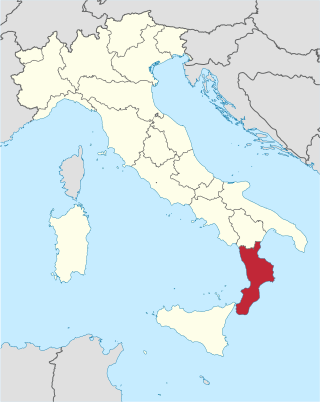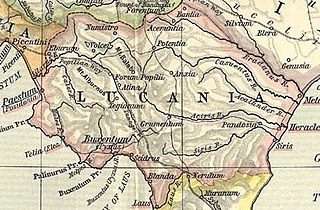See also
Late Roman and early Byzantine provinces (4th–7th centuries AD) | |||||||||||||||||||||||||
|---|---|---|---|---|---|---|---|---|---|---|---|---|---|---|---|---|---|---|---|---|---|---|---|---|---|
| |||||||||||||||||||||||||
| |||||||||||||||||||||||||
| |||||||||||||||||||||||||
| |||||||||||||||||||||||||
| Authority control databases: Geographic |
|---|
| | This Ancient Rome–related article is a stub. You can help Wikipedia by expanding it. |
Apulia and Calabria (Latin : Apulia et Calabria) was a Late Roman province in the ancient territories of Apulia and Calabria (both included in the modern Apulia region, in southern Italy). Its capital was Canusium (modern Canosa di Puglia).

Year 1127 (MCXXVII) was a common year starting on Saturday of the Julian calendar.

Calabria is a region in Southern Italy. It is a peninsula bordered by Basilicata to the north, the Ionian Sea to the east, the Strait of Messina to the southwest, which separates it from Sicily, and the Tyrrhenian Sea to the west. It has almost 2 million residents across a total area of 15,222 km2 (5,877 sq mi). Catanzaro is the region's capital. Inhabited since the Paleolithic period, thanks to its strategic location in the center of the Mediterranean, it has seen the flourishing of numerous cultures: Oenotrian, Auxonian, Greek, Britian, Roman, Byzantine, and Norman. The Greek one represents for Calabria the period of maximum splendor, with the foundation from the 8th century B.C. of numerous cities that will be for centuries among the richest and most culturally advanced of their time, constituting the fulcrum of the territory later renamed Magna Graecia by the Roman conquerors.

Robert "Guiscard" de Hauteville, sometimes Robert "the Guiscard", was a Norman adventurer remembered for his conquest of southern Italy and Sicily in the 11th century.
Tancred of Hauteville was an 11th-century Norman petty lord about whom little is known. He was a minor noble near Coutances in the Cotentin. Tancred is primarily known by the achievements of his twelve sons.

Lucania was a historical region of Southern Italy. It was the land of the Lucani, an Oscan people. It extended from the Tyrrhenian Sea to the Gulf of Taranto. It bordered with Samnium and Campania in the north, Apulia in the east, and Bruttium in the south-west, and was at the tip of the peninsula which is now called Calabria. It comprised almost all the modern region of Basilicata, the southern part of the Province of Salerno and a northern portion of the Province of Cosenza.

Griko, sometimes spelled Grico, is the dialect of Italiot Greek spoken by Griko people in Salento, and also called Grecanico, in Calabria. Some Greek linguists consider it to be a Modern Greek dialect and often call it Katoitaliótika or Grekanika (Γραικάνικα), whereas its own speakers call it Greko or Griko. Griko is spoken in Salento while Greko is spoken in Calabria. Griko and Standard Modern Greek are partially mutually intelligible.

The Gulf of Taranto is a gulf of the Ionian Sea, in Southern Italy.

Italia, also referred to as Roman Italy, was the homeland of the ancient Romans. According to Roman mythology, Italy was the ancestral home promised by Jupiter to Aeneas of Troy and his descendants, Romulus and Remus, who were the founders of Rome. Aside from the legendary accounts, Rome was an Italic city-state that changed its form of government from Kingdom to Republic and then grew within the context of a peninsula dominated by the Gauls, Ligures, Veneti, Camunni and Histri in the North, the Etruscans, Latins, Falisci, Picentes and Umbri tribes in the Centre, and the Iapygian tribes, the Oscan tribes and Greek colonies in the South.

Longobardia was a Byzantine term for the territories controlled by the Lombards in the Italian Peninsula. In the ninth and tenth centuries, it was also the name of a Byzantine military-civilian province known as the Theme of Longobardia located in southeastern Italy.

The Hauteville was a Norman family originally of seigneurial rank from the Cotentin. The Hautevilles rose to prominence through their part in the Norman conquest of southern Italy. By 1130, one of their members, Roger II, was made the first King of Sicily. His male-line descendants ruled Sicily until 1194. Some Italian Hautevilles took part in the First Crusade and the founding of the Principality of Antioch (1098).

Salentino is a dialect of the Extreme Southern Italian spoken in the Salento peninsula, which is the southern part of the region of Apulia at the southern "heel" of the Italian peninsula.

The County of Sicily, also known as County of Sicily and Calabria, was a Norman state comprising the islands of Sicily and Malta and part of Calabria from 1071 until 1130. The county began to form during the Christian reconquest of Sicily (1061–91) from the Muslim Emirate, established by conquest in 965. The county is thus a transitional period in the history of Sicily. After the Muslims had been defeated and either forced out or incorporated into the Norman military, a further period of transition took place for the county and the Sicilians.

Greek presence in Italy began with the migrations of traders and colonial foundations in the 8th century BC, continuing down to the present time. Nowadays, there is an ethnic minority known as the Griko people, who live in the Southern Italian regions of Calabria and Apulia, especially the peninsula of Salento, within the ancient Magna Graecia region, who speak a distinctive dialect of Greek called Griko. They are believed to be remnants of the ancient and medieval Greek communities, who have lived in the south of Italy for centuries. A Greek community has long existed in Venice as well, the current centre of the Greek Orthodox Archdiocese of Italy and Malta, which in addition was a Byzantine province until the 10th century and held territory in Morea and Crete until the 17th century. Alongside this group, a smaller number of more recent migrants from Greece lives in Italy, forming an expatriate community in the country. Today many Greeks in Southern Italy follow Italian customs and culture, experiencing assimilation.

The County of Apulia and Calabria, later the Duchy of Apulia and Calabria, was a Norman state founded by William of Hauteville in 1042 in the territories of Gargano, Capitanata, Apulia, Vulture, and most of Campania. It became a duchy when Robert Guiscard was raised to the rank of duke by Pope Nicholas II in 1059.

The Griko people, also known as Grecanici in Calabria, are an ethnic Greek community of Southern Italy. They are found principally in regions of Calabria and Apulia. The Griko are believed to be remnants of the once large Ancient and Medieval Greek communities of southern Italy, although there is dispute among scholars as to whether the Griko community is directly descended from Ancient Greeks or from more recent medieval migrations during the Byzantine domination.
The Italo-Dalmatian languages, or Central Romance languages, are a group of Romance languages spoken in Italy, Corsica (France), and formerly in Dalmatia (Croatia).

Italiot Greek, also known as Italic-Greek and Salentino-Calabrian Greek refers to two varieties of Modern Greek, spoken in Italy by the Griko people.
The following is a timeline of the history of the city of Reggio Calabria, Italy.